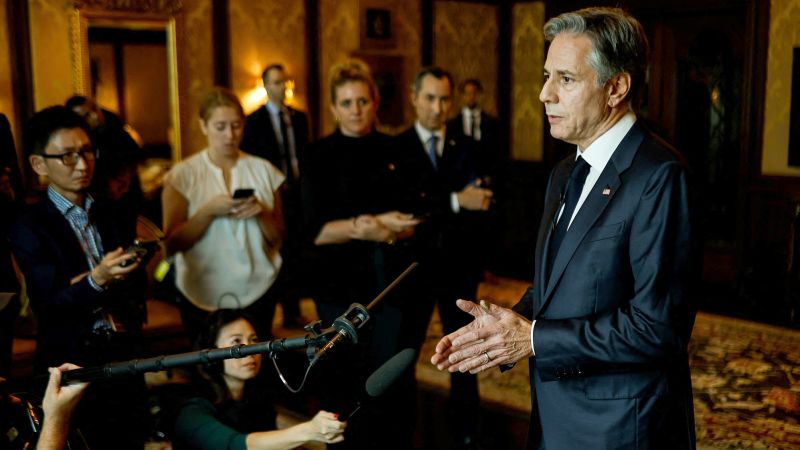Secretary of State Antony Blinken on Friday gave one of his most direct condemnations of the civilian death toll in Gaza and said more needs to be done to “minimize harm to Palestinian civilians.”
Although Blinken commended Israel for its announcement of daily military pauses in areas of Northern Gaza and two evacuation corridors, he said that “there is more that can and should be done to minimize harm to Palestinian civilians.”
The top US diplomat has subtly shifted his messaging in the days since he departed the Middle East earlier this week to more directly voice condemnation of the civilian toll in Gaza and the US’ expectations for the Israeli government. However, he still has not condemned the Israeli government offensive and has continually voiced support for its right to defend itself.
“Far too many Palestinians have been killed. Far too many have suffered these past weeks,” Blinken said at a press availability in New Delhi at the end of a whirlwind trip that also included stops Israel, Jordan, the West Bank, Turkey, Iraq, Japan and South Korea.
“We want to do everything possible to prevent harm to them and to maximize the assistance that gets to them,” he said.
“To that end, we’ll be continuing to discuss with Israel the concrete steps to be taken to advance these objectives,” Blinken said, but declined to detail the specifics of those steps.
In Tokyo on Wednesday, Blinken described the US’ terms for a “durable and sustainable peace” in Gaza after the war, and on Friday he reiterated that “some progress” had been made in setting those “basic principles.”
“No forcible displacement of Palestinians from Gaza. No use of Gaza as a platform for launching terrorism or other attacks against Israel. No diminution of the territory in Gaza and a commitment to Palestinian land governance for Gaza and the West Bank and in a unified way,” Blinken said Friday. “These and some other ideas that we’ve put forward, and that others share, I think, can start to be the basis for what we need to do.”
“We have concrete plans, concrete things that we’re working on that that would” increase the amount of trucks with humanitarian aid reaching Gaza, Blinken said.
But “it’s always a process and moving from an understanding, moving from an agreement to the implementation is what we’re working on right now,” he added.
Blinken reiterated Friday that the US “will continue to focus relentlessly on getting our hostages home” and stopping the conflict from expanding.
Speaking in India Friday, Blinken said “some progress has been made” in the week since he met in Tel Aviv with Prime Minister Benjamin Netanyahu and other Israeli officials, but “this is a process and it’s not always flipping the light switch.”
The White House said Thursday that Israel had agreed to move forward with daily four-hour pauses of military operations in areas of Northern Gaza. Blinken had an agreement in principle on the pauses after his meetings in Israel last Friday, US officials told CNN, though Netanyahu came out publicly against the idea just hours after the meeting. Those public comments were seen as messaging for his domestic audience and war cabinet, but one official noted that “every step of this is like pulling teeth.”
Blinken met Saturday with Arab counterparts in Jordan, and there was a clear divide between the US and regional leaders on the matter of a ceasefire.
On Wednesday at a meeting of the G7 Foreign Ministers, however, there was joint supported for humanitarian pauses -– not a ceasefire -– in Gaza “to facilitate urgently needed assistance, civilian movement, and the release of hostages.”
At a news conference following that meeting, Blinken said that “those calling for an immediate ceasefire have an obligation to explain how to address the unacceptable result that would likely bring.”
Read the full article here





